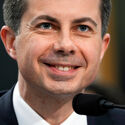 It was the Sunday afternoon slump: the end of a sunny weekend in Los Angeles, where I live, and I was coming to grips with the reality of the work week ahead.
It was the Sunday afternoon slump: the end of a sunny weekend in Los Angeles, where I live, and I was coming to grips with the reality of the work week ahead.
Around 4:45 pm PT came the first news that former South Bend Mayor and Democratic nominee hopeful Pete Buttigieg had suspended his incredibly inspiring campaign, as polls showed him lagging badly in Super Tuesday.
My heart sank. I had been supporting Mayor Pete from the beginning. I had been monitoring his every TV appearance, donating to his campaign when I could, and making the case to my friends & family that he was the best person to run our country right now. Not only did I appreciate that as a gay man he was breaking through political ceilings, but I felt like we finally had a Democrat running who could bring all sides together.
Even though I am five years his senior, Pete was the first politician I could relate to directly. I had admired many pro-gay Dems: Hillary Clinton, Barack Obama. But Pete was different. He’d overcome adversity in a small town to find himself and to come out to friends and family, just as ordinary gay men must. He’s marriage to Chasten is as authentic and beautiful as my own. He also enjoys a rich religious life (I’m more on the spiritual side), but the radical love he expresses in his sense of Christianity has the potential to bring people together and was a direct challenge to the sacrilegious notion that the Bible condemns gay people.
How about we take this to the next level?
Our newsletter is like a refreshing cocktail (or mocktail) of LGBTQ+ entertainment and pop culture, served up with a side of eye-candy.
Pete skewers the hypocrisy of the religious right better than anyone who has entered the national political scene in a long time. “For a party that associates itself with Christianity to say it is okay to suggest that God would smile on the division of families at the hands of federal agents, that God would condone putting children in cages, has lost all claim to ever use religious language,” he said at the second night of the first Democratic debates in Miami.
Most importantly, he could beat Donald Trump at his own game, simply because he is smarter and more articulate. Despite being half Trump’s age, he’s definitely more mature (not really that hard!). When Trump nicknamed Pete “Alfred E. Neuman,” Pete dryly pointed out how out of touch Trump is with young people. “I’ll be honest, I had to Google that,” said the 38-year-old Buttigieg. “I guess it’s a generational thing – I didn’t get the reference.”
A week before he dropped out, I’d mailed my California absentee ballot with the pen mark next to his name, filled with pride that I’d had the historic opportunity to vote for the first serious, openly gay Presidential candidate. And not any presidential candidate. And as I began reflecting on this Sunday afternoon, I was surprised to realize that the sinking feeling was replaced by gratitude for Pete’s amazing campaign for the most powerful job in the world, a position that just a few years earlier would have been unthinkable for an openly gay man (let alone one who shows affection for his husband on international TV on a regular basis).
As I lamented his withdrawal, I began scrolling Facebook, as one does when a major story breaks. Almost every single post in my feed was about Pete, an outpouring of love for what this man and his campaign had meant to them. The hashtag #ThankYouPete was trending in a big way, and the general feeling matched my own: Pete carried himself with grace, poise, and quiet strength throughout his run, and had not only opened doors for other LGBTQ’s in politics but set the stage for his own shot at the presidency in the future (when the 70-somethings now dominating politics will likely be gone).
As someone who’s dealt with fewer opportunities in my chosen industry for being openly gay years before that was welcome, I’m grateful to @PeteButtigieg & @Chas10Buttigieg for ignoring the odds & assumptions & creating a path for LGBTQ in politics that simply did not exist. ??
— billy eichner (@billyeichner) March 2, 2020
Reading post after post of what Pete had meant to my friends (mostly members of the queer community), my eyes began to well up. This was hardly the defeat I’d anticipated. And it wasn’t just historic–it was a powerful, healing and symbolic movement.
As LGBTQ, we haven’t always seen ourselves reflected in large spans of American life. Sure, representation in Hollywood and streaming services like Netflix has improved dramatically over the years. There are openly gay people throughout the mainstream media. (Thanks Anderson and Ellen!) But there are only a handful of prominent LGBTQ business leaders in the US, and the Trump administration hasn’t had many major openly gay officials. (Sorry, GOP, Richard Grenell doesn’t count).
Electoral politics has seen the rise of amazing elected representatives at the state and local level, including Danica Roem who in 2018 was elected Virginia’s first openly gay transgender legislator. Tammy Baldwin was elected to the Senate from Wisconsin in 2002, and is a serious Vice Presidential candidate. Jared Polis’s historic win in Colorado made him the first gay state governor in the U.S. Barney Frank was a pioneer, coming out in 1994 and earning a reputation as one of history’s great legislators before his retirement in 2008.
But the presidency is a whole different playing field. For a gay candidate to compete seriously, it would mean acceptance on a large scale, including conservative states who have long balked at electing queer people anything higher than dog catcher.
Everyone knew it was a long shot. But every time I would see him at a rally or at a fundraiser or on talk show, witnesssing just how effective his message was, the decency and values he promulgated, my heart smiled, reminding me that there is nothing on earth beyond our reach as queer people. (Ok, we probably won’t get elected to lead Iran or Russia anytime soon.) I was shocked visiting my conservative parents in Savannah last September. My stepdad (who is an avid Republican and Trump-voter) said of all the current candidates on the Dem’s side, he liked “that Mayor Pete the best.”
From my perspective as a therapist who works to help traumatized gay men love themselves, maybe I too can internalize in a deeper way my legitimacy and power as a queer person, and place more trust in my ability to help others who in turn will help still more. I was deeply insecure in my 20’s and even early 30’s, feeling like I didn’t have much to offer, and that I had missed the boat on having a normal, healthy life. It took me years of healing to embrace my worth, and I think that’s a process that continually unfolds. Pete and Chasten as role models will certainly hurry this process along.
On Feb 22, Pete addressed a boy who wanted help coming out to his family.
Powerful moment (better audio): 9 year old Zachary Ro of Lone Tree asks @PeteButtigieg how he can be brave and tell people he is gay too pic.twitter.com/1aUbYM8cDM
— Joe St. George (@JoeStGeorge) February 23, 2020
In the latter part of his response, Pete said, “The second thing I want you to know is that you will never know who’s taking their lead from you, who’s watching you and deciding that they can be a little braver because you have been brave.” Although he was talking about the boy, I couldn’t help but see how Pete was actually talking about himself, and the millions he will inspire.
As the audience chanted “2024! 2024 2024!” during his concession speech, instead of feeling sad, I found myself smiling, knowing that this eloquent trailblazer has a promising future. Despite all Trump has done to demoralize American citizens, and degrade the White House, I felt optimistic again that our fight for an equal place in American life had taken another huge step forward.
As Pete’s husband Chasten said last night with tears in his eyes (and mine) before kissing his hubby on the national stage, “Pete got me to believe in myself again.”
As a community, I think we can say the same thing.


















Jared MacBride
You lost all credibility call Hillary Clinton a pro-gay Democrat. She was no such thing.
Jazz
Give it a rest.
winemaker
Are you kidding, hillary clinton being pro gay? What has she done for us? Answer: she did ZILCH for the gay community other than pander to us for votes just like she did to the Latinos,. Jews and blacks. To her and the liberal party we’re just pawns to pander to when election time rolls around to get what they want, votes. If you don’t believe me what the liberals do and have done,take a look at San Francisco, the gay paradise that’s become a third world enclave here in the USA and was recently named the ‘doo doo’ capital of America due to the toilet like streets!.
Beachman
LOL!!! Like Hillary doesn’t like gay people…..what a moron you are.
Donald, you really have more important things to do than troll Queerty….
kevininbuffalo
Personally I didn’t like Pete, there’s something very cold about him. He’s also a Clinton style “Third Way” DINO and I think we need to move beyond that. I also prefer candidates with some experience. Mayor of the 4th largest city in Indiana just doesn’t cut it. I would never vote for an anti LGBT candidate but neither am I going to vote for someone simply because they’re Gay. There’s a whole bunch of boxes a candidate has to check off for me and their sexuality isn’t one of them. So I’m not mourning the loss of Mayor Pete. I’m sure some Gay’s who make their sexuality the center of their universe do but I don’t. I was glad to see the man from HR go. His campaign was an exercise in ego and nothing else.
CityguyUSA
He kept selling his soul piece by piece as he would get deeper and deeper into running what was progressive when he started running became more and more Wall St, Blue Dog or whatever you want to call it.
Then came the news of his questionable 6 months spent in the service for which no one seems to know what he even did and it appears that it was more of a trick to deceive people.
Beachman
Wow….how ignorant and self-hating you are, and have oh so much to learn about life if you ever pull your head out of your a$$ and experience the real world, and not just the world you choose to view. On what basis do you make such accusations of Mr. Buttigieg? Did his big ego lead to him winning the Iowa Caucuses? Have you ever been the mayor of a major US city?
Please don’t project your own negative opinions of yourself onto others, it only shows your own self-hatred and ignorance. And we see that everyday from our current President.
justyouandi
He entered the race as a 37 year old with no great success in anything. His father was a Marxist, and Pete seems to be leaning that way. Of course, he can’t say that now, but I feared it would come out if he got to the White House. He misrepresented and exaggerated his military experience … big time! He arrogantly misquoted the Bible scripture and defined Christianity in a way that is unlike any Christian I know.
He plays the “victim” card. I don’t want a “victim” in the White House; I want a strong person who has overcome and never even thinks about having had a time when people might not have been nice to him.
But he’s gay!
Well, …. there’s that!
Joshooeerr
“His father was a Marxist”. What – and his mother smelled of elderberries?! And you want us to take anything you say seriously? If you can listen to Buttigieg and conclude that he’s leaning toward Marxism too, then you either don’t know what Marxism is, or you need to be checked for paranoid delusions.
Jazz
“He misrepresented and exaggerated his military experience”, what is your source for this claim?
Taiyoken
Of course, I didn’t like Pete either, but what bothers me is the lack of policy discussion. Almost nobody who likes or dislikes Pete (or most people running, for that matter) ever talked about his policies. Policies tell you what someone plans to DO as president. his policies were the same as Hillary and Biden. His most unique position was mandatory military service, a wildly unpopular policy that people and the media conveniently ignored.
jasentylar
Clearly you weren’t paying attention either. His policy wasn’t mandatory military service, but civic service. There is a difference. His plan for civic service was popular among Democrats and Republicans so you can keep your lies.
Frank Treadway
The former comments are from presumed LGBT folk who just can’t get a grip on their own sexuality or gender identity. Come on, what do you want in a POTUS ? Self-hating is not an excuse for saying nothing but ‘he’s not one of us, he’s a victim, he has no experience, etc’…well guess who else is not one of us, had no experience and he creates victims on a daily basis, yep, the current dude in the White House and you all likely voted for him. You of the ‘never satisfied segment’, do some reflecting and ask yourself, “Who am I” ? Pete, see you in 4 years !
Cam
Oh give it a rest, seeing an LGBTQ candidate onstage kissing his husband on one side. On the other we had Bernie who argued AGAINST gay marriage saying that civil unions were good enough, yet his supporters now SCREAM that he’s always been with us. Give it a rest bros.
Taiyoken
Oh, YOU give it a rest. Bernie was briefly in favor of civil unions at a time when many gays were also in favor of civil unions, Hillary and Obama were against civil unions and gay marriage. Biden was for the constitutional amendment banning gay marriage, Bernie was against it, and against DOMA and against Don’t Ask. Bernie was for gay rights, women’s’ rights, and racial minority rights his whole life. The best you can find against him was a five minute window when civil unions was a serious contender for a compromise between those for and against gay marriage? Is he against gay marriage NOW, or any gay rights for that matter? I think that speaks to how great a candidate Bernie really is. If you care about gay rights support history, should we go over Biden’s record now? You really seem to care about the candidate’s gay rights record, right, Cam?
And to restate what I said above no one is talking about policies. Pete wanted to force people into the military, let tens of thousands pass away from no healthcare, have five hundred thousand more go bankrupt from healthcare bills and leave two generations in perpetual student debt, but oh, he kissed his husband on stage, and he’s gay, just like me, so all that other stuff is okay.
Unless you can actually defend Pete’s policies and history, i don’t care to hear about how gay he is.
It would be nice to have the first gay president, but wouldn’t you want the first gay president to be a GOOD one?
Cam
@Taiyoken
Sweetie, if you’re going to try to lie, it’s better if you lie about things that can’t be checked. Not only was Bernie opposed to gay marriage, at a time when neighboring state MA was legalizing it, he voted against the Brady bill multiple times, and was a supporter of the NRA until recently when the party made it clear he didn’t have a chance if he continued his support.
But please, by all means, keep attacking the gay candidate and supporting the NRA candidate who was opposed to LGBTQ rights until it was convenient.
Taiyoken
Are you seriously comparing Bernie, the most left wing candidate in this election, to an anti-gay, pro-NRA candidate? Are you for real? How desperate can you get? And once again you boast Pete purely on the fact that he is gay. you have no substance in favor of Pete, that’s why you can’t win on policy and try to attack Bernie on flimsy grounds.
Speaking of which, don’t tell me not to lie and then go and lie yourself, Bernie has a constant bad grade from the NRA except one year ( a mere C-) when he supported a bill the NRA also happened to support(which had child-lock provisions) I support this bill too. But that’s a different argument. Additionally, Bernie voted against a different version of the Brady bill because it didn’t have instant background checks. But you didn’t read the actual nature of the facts, did you? You’re just going down an anti-Bernie talking points worksheet.
I’m done with you. Despite all our posts you’ve still got nothing better than “but Pete is gay” I will NEVER put the random circumstances of a candidate’s birth (sex, orientation, race) over their policies when I vote.
Bernie is Jewish, but notice how I always defend him on the policies he’s actually running on, attacked Pete and Biden on the policies they’re running on, and never once accused you of being antisemitic for not supporting Bernie? that’s the difference between us “sweetie.”
Prax07
I’m not going to be voting come November, I liked Pete, and would have voted for him. But with just Biden, Sanders, and Bloomberg left… nah. I don’t like any of them. They’re too old, too old school, too infirm (Sanders and his bad heart), and too rich. I loathe Trump, and wish him the worst, but none of the three candidates seem much better to me. And if Pete seemed cold it’s probably his military training and experiences showing.
Doug
I agree with you here. I’d planned on voting for Pete last Tuesday. In any case, I’ll vote for anyone who wins the primaries. Trump should never have become a POTUS for one term, much less two.
Cam
Oh give it a rest, the media already exposed the troll accounts that were going onto black, gay, and women’s sites trying to convince people not to vote if their candidate didn’t win in order to help Trump. Sorry but LGBTQ sites have been dealing with smarter trolls than you for years. Try again Boris.
paul dorian lord fredine
if you don’t vote just because your candidate of choice didn’t make it you might as well vote for lord dampnut. unless, or course, that’s really what you want? if you want change #votebluenomatterwho, otherwise we’re in store for four more years of hate, bigotry and stupidity. our lives, not to mention the fate of the world, are at stake. the tangerine turd has got to go. sorry your feelings were hurt because pete’s no longer in the race, but, really, grow up.
kookookachoo
Thank you for this great piece. Your publication has some very talented and inspiring writers. I’m very grateful to them.
jasentylar
I loved Pete’s policies and appreciated how smart he was. Give him time to do more work on the national stage and he and Chasten will be ready to move in the White House for 2024.
jasentylar
Another thing, most of the country is moderate/centrist. So the uber progressive can shove it.
Buie
Jake Myers, I thinks your commentary spoke for the overwhelming majority of LGBT Americans. Don’t let these negative and ill-informed comments discourage you. Most of them are probably working out of Moscow or Rush Limbaugh’s basement.
ScottOnEarth
Great writing! While Pete was not my preferred candidate, the strides he made in being a married, openly-gay man and a serious contender for the highest office in the United States are tremendous. He made history and always, always maintained a dignified, intelligent and gracious stance in the face of anti-gay comments. He has a bright future and I hope he gains the experience he needs to make another go at being our President.
Prax07
@Dorian Lord I’m not giving my vote to someone I don’t want running the country, and I’m not giving it to just anyone that’s not Trump. I can’t stand Bloomberg or Biden, they’re both rich @ssholes, and Sanders could drop dead any second. So no, I’m not wasting my time voting for any of them now. There’s no point when they’re All bad choices. Have a terrible orange turd in there or one of three blue turds. The choice sucks so not going to be making one.
succubus
you sound like PWWO….another fool.
cwaigy
I’m not even in the country and I feel sad for him not winning and if he wants I’d vote for him to be our politician here in Australia